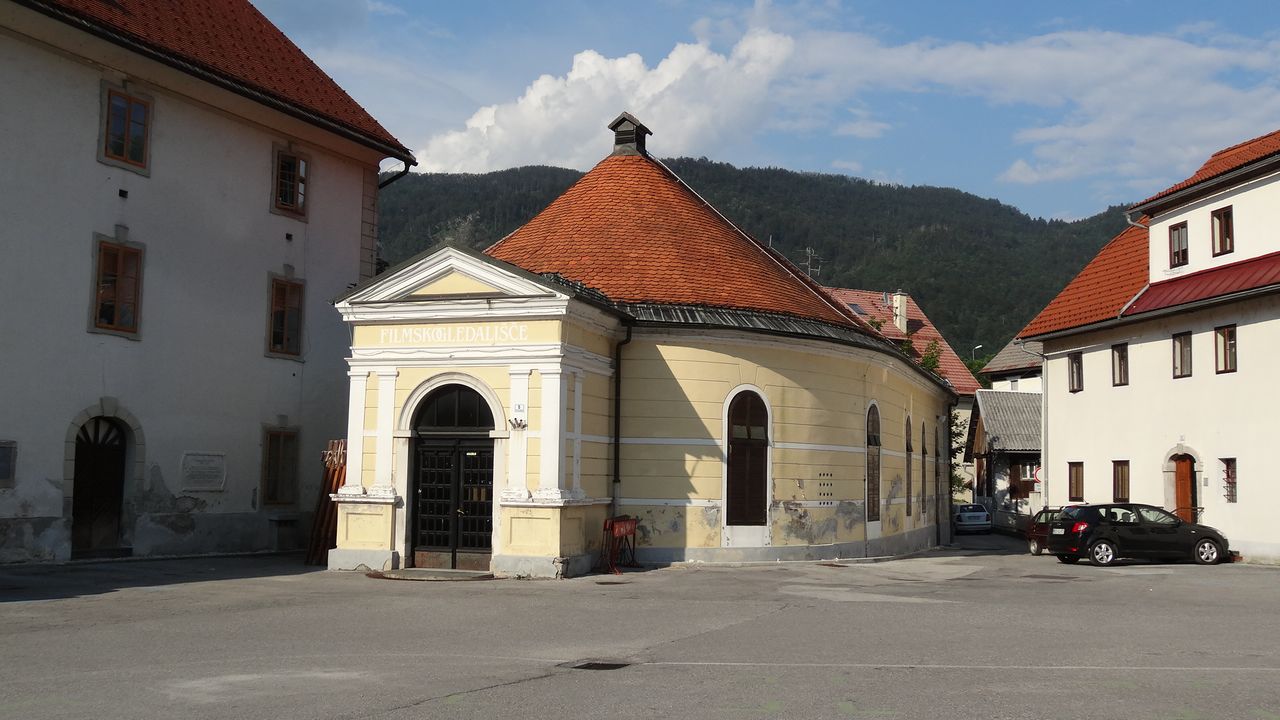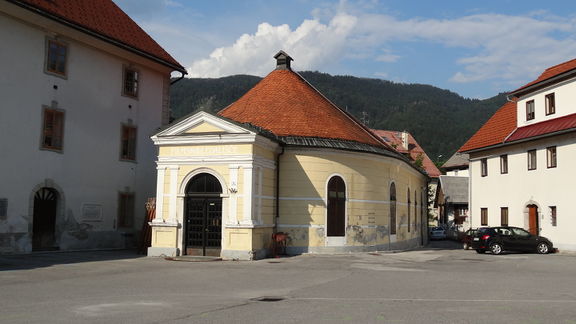Difference between revisions of "Film Theatre Idrija"
(teaser adaptation for front page) |
Anže Zorman (talk | contribs) (slo teaser change) |
||
| (One intermediate revision by one other user not shown) | |||
| Line 34: | Line 34: | ||
Due to reconstructions in the 20th century the interior no longer resembles the former Baroque theatre. The cinema hall is now run under the auspices of the [[Idrija City Library and Reading Room]] and is a member of Slovenia's [[Art Cinema Network]]. Along with a very diverse list of films screenings, the programme occasionally also includes theatre productions, lectures and music concerts. | Due to reconstructions in the 20th century the interior no longer resembles the former Baroque theatre. The cinema hall is now run under the auspices of the [[Idrija City Library and Reading Room]] and is a member of Slovenia's [[Art Cinema Network]]. Along with a very diverse list of films screenings, the programme occasionally also includes theatre productions, lectures and music concerts. | ||
}} | }} | ||
| + | {{TeaserSlo|Filmsko Gledališče Idrija velja za najstarejšo ohranjeno gledališko stavbo na Slovenskem. Danes je namenjeno predvsem filmskim projekcijam.}} | ||
==Background== | ==Background== | ||
Latest revision as of 16:09, 11 February 2021
Background
Operating since around 1500, the Idrija mercury mine used to be one of the largest mercury mines in the world, which consequently meant the town was of some regional importance. When the mine was at the height of its development in the mid-18th century, Idrija was given town privileges and constructed numerous public buildings. Among them was the Miners' Theatre House, its construction financed from voluntary contributions by the mercury mine employees and nowadays usually considered to be the oldest such building in Slovenia (though the provincial capital Ljubljana had managed to acquire its own, slightly larger theatre just a few years earlier).
In the years that followed, various travelling German and Italian theatre groups most commonly appeared in the Idrija theatre, but after 1850 an increasing number of performances were in Slovenian language. The establishment of the Idrija Dramatic Society in 1889 was of a particular importance for this shift. Nevertheless, in 1905, the stage was removed and the building became the town's fire department headquarters. In 1913 it was renovated as a theatre again, but was closed down only a year later to be used as accommodation for prisoners of World War I. It was renovated once again in 1920 but turned into a storage facility three years later.
After some further lively history, the building was reopened in 1952 as a local cinema, and then further subjected to quite some modifications. In 2001 it was declared a cultural monument of national importance and as of 2015 run by the Idrija City Library. As of 2012, the building is considered a part of mercury mining heritage and as such is featured on the UNESCO World Heritage List.
Programme
Film Theatre Idrija runs a very wide-ranging film programme that includes art cinema production as well as films for children. Additionally, it runs a strong programme of documentaries of Slovene origin, often accompanied by presentations by its creators and protagonists. It also runs a series of films that relate to mountaineering and climbing, organised in collaboration with the Mountain Culture Association.
The venue is used to screen the programme of animated films run by the Animateka International Animated Film Festival and is also one of the venues of the Deuje babe Festival and the Idrija Lace Festival.
See also
- Mercury mining heritage on Culture.si
- Idrija City Library and Reading Room
- Idrija Mine Museum
- Art Cinema Network
- Municipality of Idrija
- International Festival of Mountain Film
- Deuje babe Festival
External links
- About Film Theatre Idrija on the Idrija City Library and Reading Room website (in Slovenian)
- The Miners' Theatre in Idrija, the history of the oldest theatre in Slovenia from the Theatre Architecture in Central Europe (TACE) web database
- A short introduction to Idrija Heritage
Gallery
 The building of the Miners' Theatre in Idrija was built in the 1770s, it is considered the oldest theatre building in Slovenia. +
The building of the Miners' Theatre in Idrija was built in the 1770s, it is considered the oldest theatre building in Slovenia. +


